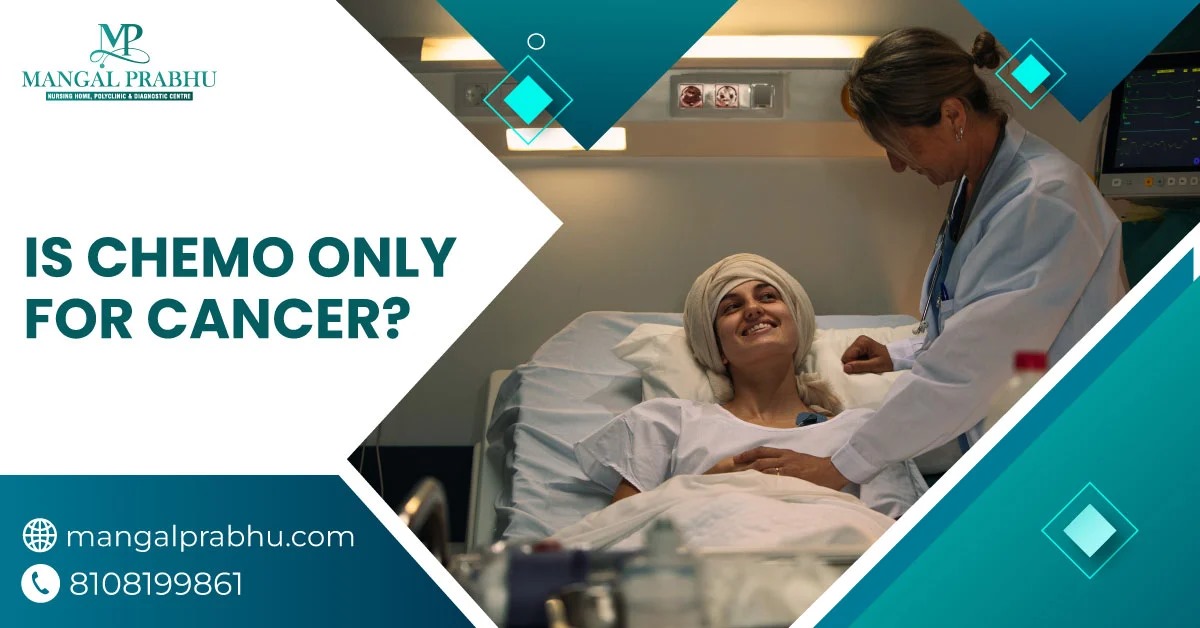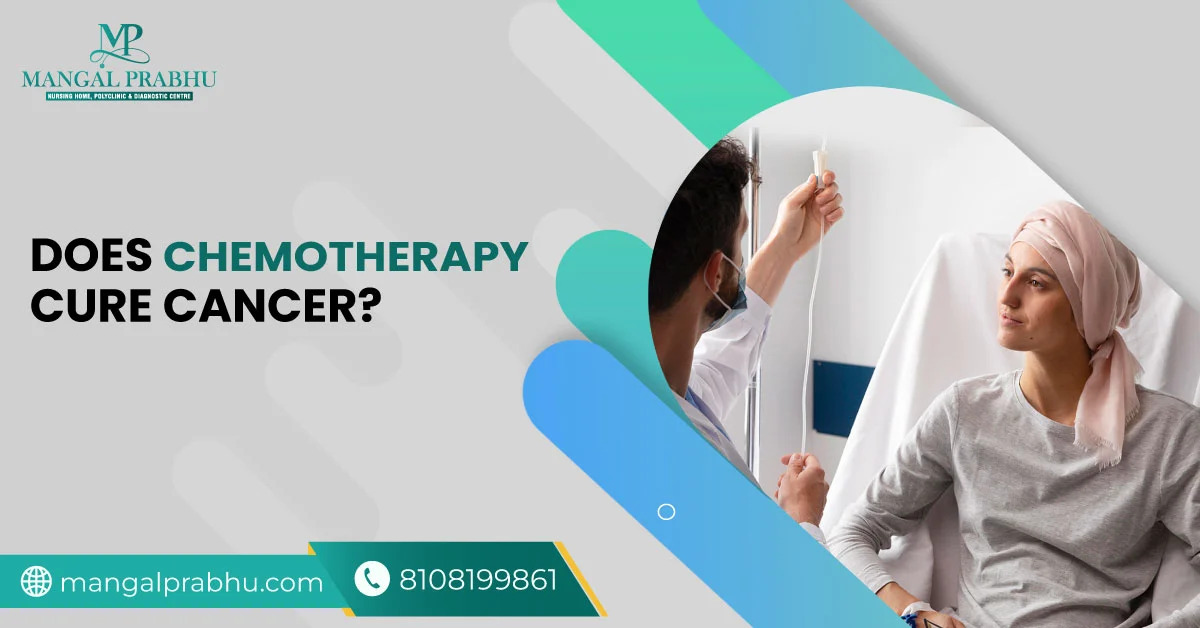
Is Chemo Only for Cancer?
What’s the first word that comes to your mind when you hear the word chemotherapy? Cancer. Chemotherapy is the most common treatment for different types and stages of cancer. Depending on the severity of the cancer, oncologists in Navi Mumbai perform chemotherapy either as a standalone treatment or in conjunction with surgery, radiation therapy, hormone therapy, and other procedures.
The question is, is chemotherapy only for cancer? No! It’s also used to treat certain autoimmune disorders and blood disorders. Let’s see what chemotherapy can treat.
Common Uses of Chemotherapy
For Cancer
More than a hundred types of chemotherapy drugs are used to treat different types of cancer. Cancer cells are known for multiplying rapidly. The initial stage of cancer is often confined to a specific organ, but it can spread to the surrounding tissues, lymph nodes, and organs if left untreated. Treatment gets harder as the cancer reaches an advanced stage.
Chemotherapy drugs kill the rapidly multiplying cancer cells. The goal of the treatment is to stop the cancer cells from growing or replicating. The number of chemotherapies required for each patient can vary depending on their cancer diagnosis and how far it’s spread.
For Non-Cancerous Diseases
Chemotherapy can be used in low doses or high doses for non-cancerous conditions, especially autoimmune disorders.
i) Autoimmune Disorders:
Lupus and other autoimmune disorders, in which your immune system attacks your organs and tissues, can be treated with chemotherapy. The therapy can suppress an overactive immune system.
ii) Bone Marrow Disorders:
Bone marrow diseases in which your bone marrow fails to produce adequate red blood cells might require chemotherapy combined with blood transfusion and bone marrow transplant. Chemotherapy is often performed before a bone marrow transplant to destroy the damaged bone marrow cells.
iii) Infections:
Some types of severe and persistent fungal infections can be treated with chemotherapy. Antifungal agents are used to offer relief to the patient. Viral infections that do not respond to the antiviral medication might also require chemotherapy, especially in patients with compromised immune systems.
Potential Side Effects of Chemotherapy
As mentioned earlier, chemotherapy kills cells that grow rapidly, which might also include the healthy cells in your gut and those responsible for your hair growth. So, side effects are not uncommon after each session. The severity of the side effects and how long they last depends on the chemo drugs you are given and the dosage. Here are possible side-effects of chemotherapy:
- Fatigue
- Hair loss
- Mouth sores
- Memory loss (also called chemo brain)
- Fertility issues
- Nausea and vomiting
- Loss of appetite
- Diarrhea or constipation
The side effects can vary from person to person. These are short-term issues that resolve on their own once the treatment stops and the new cells start to grow. Chemotherapy is also associated with long-term side effects, such as damage to your vital organs, like the heart, lungs, and reproductive system.
Conclusion
You can learn more about different types of chemotherapies and multiple methods used to administer the chemotherapy drugs into your body at the chemotherapy hospital in Navi Mumbai.

Does Chemotherapy Cure Cancer?
Recovery from cancer is not a cakewalk. The first thing that strikes our mind when it comes to cancer is chemotherapy. It’s a treatment used to kill cancer cells through intravenous administration of the drugs.
These drugs are designed to destroy the rapidly multiplying cells, thus inhibiting cancer growth. While chemotherapy treatment in Navi Mumbai is quite effective in treating cancer, the procedure comes with many side effects. Besides, there’s no guarantee it will cure cancer and prevent relapse.
How Chemotherapy Works
Depending on the type and stage of cancer, chemotherapy can be used as a standalone procedure or in conjunction with radiation therapy and surgery. It can shrink the tumor and destroy cancer cells. Most chemotherapy drugs are given intravenously, but your doctor might recommend a topical application, a single injection shot, or pills.
An oncologist in Navi Mumbai will tell you the number of chemotherapy sessions you need to undergo to kill cancer. Then, based on how your body responds to the treatment, your doctor will either stick to the plan or advise additional treatment, such as surgical removal of the tumor, radiation therapy, or hormone therapy, for the best outcome.
Effectiveness of Chemotherapy
The effectiveness of chemotherapy can vary for each patient. It depends on the type of cancer, the patient’s overall health, the size of the tumor, and how far it’s spread. However, studies show that those exposed to chemotherapy have a better survival rate than those who never undergo chemo. The sooner you report your symptoms and get an accurate diagnosis, the higher your survival rates.
Note that cancer can return even after you are declared cancer-free. Some types of cancer have a chance of relapse, requiring more rounds of chemotherapy. Your oncologist will schedule regular follow-up visits to ensure the cancer has not returned.
Limitations of Chemotherapy
The chemo session isn’t always painful, especially not for those taking it through pills and topical. Intravenous chemo and injections can hurt a little, but it’s nothing more than a slight burning sensation.
Chemotherapy is used to destroy the rapidly growing cells in your body. That’s how it helps kill cancer fast. However, cancer cells are not the only cells that multiply quickly. The cells in your skin, hair follicles, digestive tracts, and other parts of the body also grow fast.
Cancer treatment can also destroy these healthy cells, leading to side effects such as hair loss, fatigue, constipation, diarrhea, vomiting, loss of appetite, and infection. The good news is that the side effects of chemotherapy last for a short while, usually until your treatment stops. Some side effects are, however, permanent. They include infertility, heart problems, and early menopause.
Conclusion
Chemotherapy is an effective way to kill cancer, but the treatment comes with side effects and is usually advised with surgery and other procedures. Ask your oncologist about the success rate of chemotherapy and the side effects. Fortunately, some types of cancer disappear completely following the chemotherapy and don’t require additional treatment. But there’s always a chance of a relapse.
